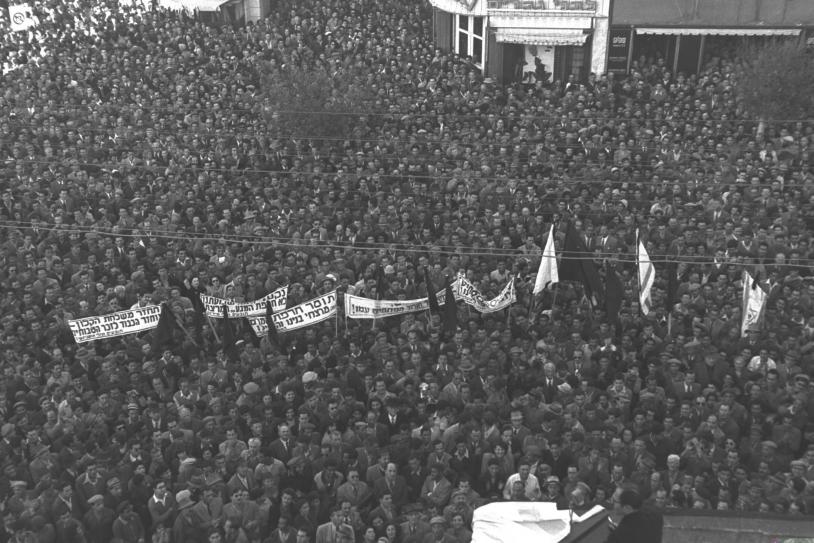The surprising story behind Israel's complicated love affair with Germany
Since official bilateral ties were established on May 12, 1965, there wasn’t a specific catalyzing moment that made the alliance so strong, says Avi Primor, former Israeli ambassador to Germany and the EU. Even earlier, following the controversial 1952 Reparations Agreement between the two countries, there came a gradual building of trust, he notes.
As German industrial goods started flowing into Israel from the 1950s on, so did the exchange of experts. “The relationship simply developed,” says Primor, noting that Germany eventually became “the locomotive we had for European relations.”
Today, although Germany disagrees with Israeli policy on settlements and toward the Palestinians, and personal relations between Chancellor Angela Merkel and Prime Minister Benjamin Netanyahu are “terrible,” as Primor puts it, both sides are committed to the relationship, and Berlin is fully committed to Israel’s security. In 2008, Merkel – the first German chancellor to address Israel’s parliament – reiterated that Israel's security was “part of Germany’s Reason of State ... It means that for me, as a German chancellor, Israel’s security is never negotiable.”
The problem is that Israel relies too heavily on this special relationship, says Dr. Sharon Pardo, from the Center for the Study of European Politics and Society at Ben-Gurion University of the Negev. He believes Israel allows its relationship with Germany to skew its view of the rest of the continent. “Israeli foreign policy doesn’t attach much importance to Europe,” says Pardo. “Israel believes it can always depend on Germany, but this is a mistake. In recent years, there’s been a shift even in Germany, and while Germany may be an important player in the European Union, it does not run it.”
Despite the pressures, can the relationship survive – and thrive – for another 50 years? According to a January poll by the Bertelsmann Foundation, 68 percent of Israelis have a good opinion about Germany, while 24 percent have a poor opinion. In 1991, those figures were 48 percent and 40 percent, respectively. In contrast, the poll found that only 36 percent of Germans see Israel favorably, with 48 percent having a “poor opinion” of Israel. This figure was 54 percent among 18- to 29-year-olds.
There is certainly less and less understanding in Western Europe for Israeli policies, notes Primor: “What works in favor of Israel is that, after the Holocaust, everyone hesitates before contradicting the Jewish state. What also helps is the very bad image of Israel’s enemies, the Arabs, but this will not hold forever – we will lose public opinion.” Still, he adds, “it will take a long time for the Germans to give us the cold shoulder.”
To mark the 50th anniversary of that strong, stable – and unique – alliance, Haaretz examines five key components of Jerusalem’s other special relationship.
How German reparations kick-started the Israeli economy
In September 1952, Israel and Germany signed an agreement that would provide the fledgling Jewish state with reparations money for crimes committed against the Jewish people during the Holocaust. Aside from attempting to right a historical wrong, this agreement would ultimately set the groundwork for Israel’s first economic boom.
Over the years, Germany has paid the Israeli government and its citizens an estimated $60 billion in reparations (according to figures from the Claims Conference, the organization long involved in reparations negotiations). This inflow of foreign currency was critical in providing for the needs of the hundreds of thousands of destitute new immigrants flocking to Israel’s shores after the state was established. It also enabled the newly born state to finance major infrastructure projects, such as the National Water Carrier, and build hundreds of factories.
At the time, though, the idea that the Jewish state would take compensation – or, as some dubbed it, “blood money” – from Germany sparked bitter controversy. Then-Prime Minister David Ben-Gurion was attacked from both left and right for what many perceived as a move designed to absolve the Germans of their guilt for crimes committed during the Holocaust. Some of the most violent protests in Israeli history erupted as the Knesset convened to vote on passing the Reparations Agreement.
Tens of thousands of Israelis protest against reparations talks between Israel and Germany, in Tel Aviv, 1952. (Hans Fin/GPO)
In retrospect, it is clear that German reparations money helped Israel avert a major economic catastrophe in its formative years. “In the early 1950s, Israel was in dire economic straits,” notes Benny Bental, a professor of economics at the University of Haifa. “The country was facing security threats, it needed to absorb huge numbers of immigrants who came with nothing, and food was running out. The reparations money from Germany basically saved the economy.”
According to the Claims Conference, to date more than 278,000 survivors have received lifetime pensions from the German government. Hundreds of thousands more have received one-time grants. Yoram Gabbay, a prominent Israeli economist who has worked in both the public and private sectors, notes that in the early years, the amount of money coming into the country each year through the Reparations Agreement was equivalent to revenues from export sales. “That’s pretty incredible when you think about it,” he remarks.
When the Reparations Agreement first took effect, he notes, the government had introduced strict austerity measures, which involved rationing food and other basic commodities. “At the time, there was very little aid coming from the United States,” says Gabbay. “Were it not for the German reparations, Israel would probably have been forced to continue rationing for another three to four years, and we wouldn’t have been able to import. The accelerated growth we later experienced in the 1960s would have been delayed.”
Initially, most of the reparations money went directly to the Israeli government. But since the mid-1960s, the vast majority has been paid straight into the bank accounts of survivors. Over the years, many outsiders have wondered how Israelis manage to spend so much more than they earn. One answer could be the German reparations money, which has helped boost the bank accounts of many tens of thousands in the country.
The irony of history: Germans arming Jews
Israel and Germany reached a deal this week regarding the sale of four new missile boats from Germany after Berlin agreed to slash about $382 million off the total cost, officials on both sides said. Israel's purchase of the vessels to protect its offshore gas rigs is being underwritten by a cool $128 million from the German government.
The deal is the latest in the long-running German policy of providing Israel “what it needs to maintain its security,” as former Chancellor Gerhard Schröder stated in 2002. Arms exchange between the two countries goes back all the way to the fifties. While Israel received some weapons from West Germany in the earlier part of that decade, in 1957, five years after the Reparations Agreement, Israel and Germany engaged in top-secret defense talks.
Though the full extent of these exchanges over the years is not known, German aid is believed to have been crucial in key Israeli battles, including the 1967 Six-Day War and the 1973 Yom Kippur War. After German unification in 1990, Berlin also provided arms and funds during the 1991 Gulf War, according to a 2007 U.S. Congress report. That report also claimed that, during the Cold War, Israel passed intelligence to Bonn on Soviet weapons captured in the Mideast.
Today, Germany is dwarfed by the United States, which gives Israel over $3 billion for defense per year and purchased $1 billion-worth of Israel’s defense equipment in 2013, compared with $705-million from all of Europe. Germany itself is a major arms exporter, ranking fourth globally according to a March report.
In recent years, German aid has mostly come in the form of discounts – tantamount to grants – such as in this latest missile boat deal, and on submarines. And there has been other aid; Defense Minister Moshe Ya'alon said this week that Germany gave Israel four Patriot missile batteries as part of a military aid program at some point during the last few years.
The high-profile, controversial deals for six dolphin submarines started in the 1990s. According to a 2012 Der Spiegel report, these subs were intended to give Israel a second-strike capability in case of nuclear attack. In fact, according to foreign media reports, Germany is thought to have provided funding for Israel’s alleged nuclear weapons arsenal.
Those 1957 defense talks – headed by then-Defense Ministry Director-General Shimon Peres and West German Defense Minister Franz Josef Strauss – were highly sensitive. While Jerusalem feared the public’s reaction, Bonn was concerned the move would be unpopular with Arab states who would then side with East Germany. In fact, in July 1959 Ben-Gurion’s government collapsed over a deal to sell arms to West Germany.
But as a result of defense ties between the two countries during the 1950s and ’60s, Israel received German supplies – including arms, training aircraft, vehicles and helicopters – often from indirect routes. West Germany, meanwhile, bought several million dollars-worth of Israeli technology, including machine guns, mortars and grenade-launchers.
While there has been some German political opposition to providing Israel with aid, mostly on the left, it remains a key component of German-Israeli ties, says the Konrad Adenauer Foundation’s Borchard. “I think this is quite crucial,” he adds, noting that it is a key factor in the favorable public opinion of Israelis toward Germany today.
The Israelis who still boycott Germany
Seventy years after the liberation of Auschwitz, some Israelis still refuse to turn a page. As a matter of policy, they do not buy any products made in Germany or set foot in the country. They represent only a tiny minority, however. The Hebrew University’s Prof. Moshe Zimmermann, an authority on Israeli-German relations, notes that Israelis are much less likely to boycott Germany than are Diaspora Jews. “Israelis believe in the discontinuity of German history, which isn’t true of Jews in the United Kingdom and the United States,” he states.
According to a recent poll conducted by Zimmermann, only about 5 percent of Israelis still boycott German products. Presumably most of them are older Israelis. That compares with roughly 20 percent decades ago. Sallai Meridor, Israel’s former ambassador to the United States and a former chairman of the Jewish Agency, belongs to this group of outliers. He does not like to use the term boycott, though. “Boycotts are used to influence or punish,” he says. “That is not at all my intention in refusing to buy German products. For me, it’s an act of memorialization. I commemorate the Holocaust every single day, not just when the sirens sound. This forces me to think about it every time I walk into a store to buy something, and it also sparks questions and discussion, which is important.”
Meridor says it’s a tradition he’s carried down from his parents’ home, and one upheld today by his own grandchildren. “For us, it’s a way of life. What happened is unforgivable and nothing can atone for it,” he says. But just like Jews adhere to different rules of kashrut, it turns out Israelis have different definitions of what constitutes a boycott of Germany. Some won’t travel there, but will purchase German products. Other won’t purchase German products, but will travel there. Still others won’t buy German cars, but will buy German appliances. Victor Weisz moved to Israel from England five years ago. He won’t buy any German products, but will travel to the country on business – so long as he doesn’t have to sleep there. “I go and come back the same day,” he says.
Alona Ferber and Judy Maltz


